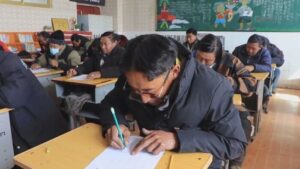 The Chinese government’s campaign to push Mandarin Chinese as the main spoken and written language for Tibetans now includes giving parents the responsibility for teaching it to their children, reports the United Kingdom-based research and advocacy group Tibet Watch. Their report dated April 11 says, “Tibetan parents, mostly nomads and farmers, whose mother tongue is Tibetan, are being forced to attend workshops and classes”.
The Chinese government’s campaign to push Mandarin Chinese as the main spoken and written language for Tibetans now includes giving parents the responsibility for teaching it to their children, reports the United Kingdom-based research and advocacy group Tibet Watch. Their report dated April 11 says, “Tibetan parents, mostly nomads and farmers, whose mother tongue is Tibetan, are being forced to attend workshops and classes”.
Tibet Watch says that this policy of forcing parents to be agents of language promotion is a “new tactic for delivering the Chinese Communist Party’s policies which erode the rights of non-Han ethnicities living under Chinese rule, to practise and develop their local languages”. The official policies use ambiguous jargon, eg “bilingual policy” as well as requiring children to attend boarding schools that prioritise education being delivered in Chinese.
The Ministry of Education of China issued a notice in July last year requiring kindergartens in all ethnic and rural areas to use the “national common language”, ie Chinese. Tibet Watch says that this “new tactic further inserts the Chinese government into the private lives of Tibetan families, putting CCP [Chinese Communist Party] messages into the mouths of Tibetan parents as they communicate with their children”. Tibet Watch further comments that it “puts pressure on parents to keep up-to-date with, and fully understand, the ever-changing policies, regulations and laws that govern language”. During the compulsory workshops for parents, attendees were told about Chinese President Xi Jinping’s vision for China, and participants were encouraged to spread everything that they had learned on their return to their villages.
The Tibet Watch report concludes, “For Tibetans, these compulsory workshops are in addition to already shrinking opportunities to practice their tradition and culture. Even in their households, they are not allowed to keep photos of their exiled spiritual leader, His Holiness the Dalai Lama, and government officials are not allowed to practise their Buddhist faith”.




 Print
Print Email
Email